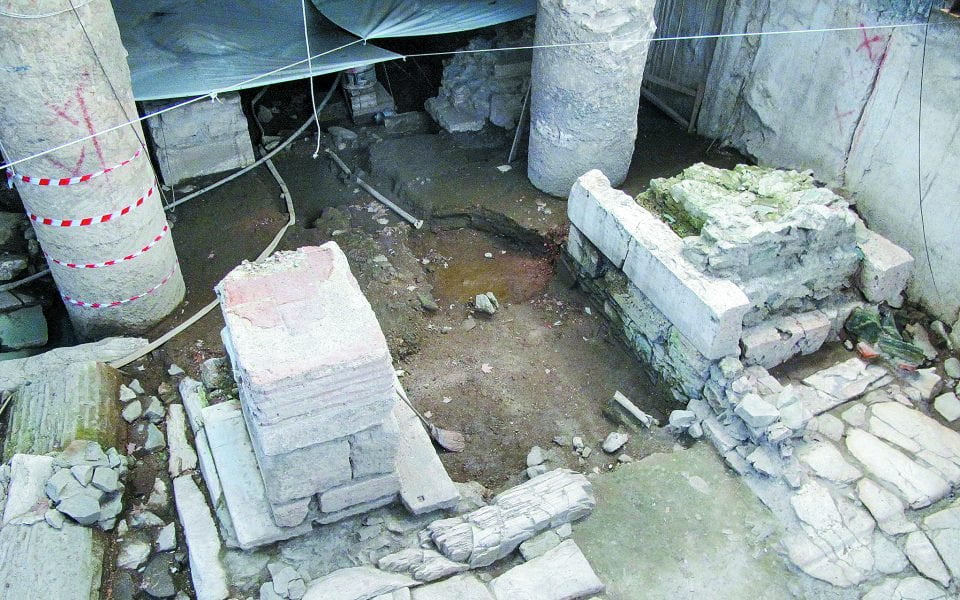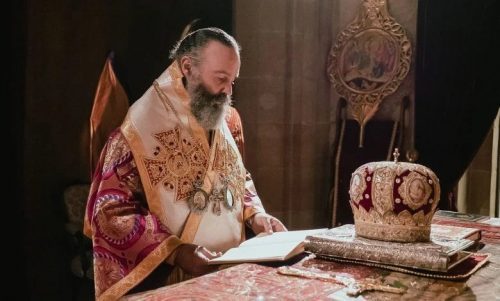Open letter to the PM: Thessaloniki metro antiquities in peril

To Mr Kyriakos Mitsotakis,
As Greeks of the diaspora, philhellenes and students of ancient and Byzantine culture, we are greatly dismayed by the recent developments jeopardizing the preservation of the important remains of Late Antique and Byzantine Thessaloniki revealed in the course of constructing the city’s metro. Since the emergence of archaeology as a modern academic discipline, this is one of the most spectacular finds from these periods anywhere in the world. The intact road that was uncovered formed the heart of the Late Antique capital and the second most important city of Byzantium such as it was developed between the 4th and the 12th centuries. Nothing equivalent is known from anywhere else, neither in this considerable territorial and chronological expanse, nor in urban significance. The paramount importance of this finding is such that the city of Thessaloniki can qualify as a primary UNESCO World Heritage site (the largest and best preserved Late Antique and Byzantine city anywhere in the world) and be developed as a tourist destination of the first order.
Although it is both appropriate and technologically possible to keep the archaeological complex around the Venizelou metro station in its place, the metro construction company prefers to dismantle it into bits and pieces, temporarily move them to storage outside the city, and place them back after the station’s construction. This procedure not only destroys underlying archaeological strata and exposes the finds to danger but has also proven to fail. Extremely important finds of the same period in the station around the square of Hagia Sophia were dismantled and moved to storage outside the city. However, the effort to put them back in their original place after the metro works were concluded was unsuccessful, since they could no longer fit in the space from which they had been extracted. This procedure threatens the authenticity of this unique complex of monuments, which is one of the criteria used by UNESCO in order to award the characterization “World Heritage site.”
For this reason, a number of Greek cultural institutions sued in order to prevent this destruction. The case was recently adjudicated by the Greek Council of State that ruled, with a narrow majority of one vote (13-12), that it is not illegal to dismantle the Venizelou finds for the quick completion of the construction. This ruling gave priority to a fast solution over the preservation of the archaeological finds in their place. The difference of one vote plainly shows that the answer to the question of what is more advantageous is not clear.
We believe that the preservation of the antiquities in their original location is consistent with the Greek state’s obligation to preserve cultural heritage – in this case cultural heritage not only of Greek but of European dimensions – and ultimately more beneficial. In terms of Thessaloniki’s touristic, economic, cultural and existential future, the preservation of the antiquities in their original location is the only appropriate course of action. The Thessaloniki finds ought to be celebrated as an unprecedented opportunity to honor and showcase the potential of modern Greek archaeology and technology. Instead, their preservation in situ is presented as a luxury that the Greek state cannot afford. Placed together with Thessaloniki’s 15 World Heritage monuments, the city can use these unparalleled finds to envision and implement a master plan for future development as a key tourist destination, ensuring economic prosperity. We implore you to intervene in order to prevent the dismantling of this singularly important patrimony and its exposure to danger. In the context of Byzantine archaeology, these monuments are so unique that their displacement/destruction would be a calamity tantamount to Francesco Morosini’s bombardment of the Parthenon in 1687.
Applicable plans that will allow the people of Thessaloniki to enjoy the benefits of a city metro without losing the most important evidence for the continuity of urban life in their city for 24 centuries do exist. Now they should be implemented.
Panagiotis Agapitos, Professor of Byzantine Literature, University of Cyprus
Suzanne Akbari, Professor of Medieval Studies, Institute for Advanced Study, Princeton
Michael Alram, Director of the Coin Cabinet of the Vienna Museum of Art; Vice President of the Austrian Academy of Sciences
Dimiter Angelov, Dumbarton Oaks Professor of Byzantine History; Faculty Affiliate of the Department of Classics, Harvard University
Roderick Beaton, Koraes Professor of Modern Greek and Byzantine History, Language and Literature Emeritus, King’s College London; Fellow of the British Academy; Commander of the Order of Honor of the Hellenic Republic
Roger Bagnall, Professor of Ancient History Emeritus and Leon Levy Director Emeritus, Institute for the Study of the Ancient World/New York University; Member of the American Academy of Arts and Sciences; Member of the American Philosophical Society
Glen Bowersock, Professor of Ancient History Emeritus, Institute for Advanced Study, Princeton; Member of the American Academy of Arts and Sciences; Member of the American Philosophical Society; Foreign Member of the National Academy of the Lincei; Doctor honoris causa of the University of Athens; Knight of the Legion of Honor
Peter Brown, Rollins Professor of History Emeritus, Princeton University; Member of the American Academy of Arts and Sciences; Doctor honoris causa of the University of Thessaloniki; Knight of the Order of Arts and Letters
Leslie Brubaker, Professor of Byzantine Art, University of Birmingham; Director of the Center of Byzantine, Ottoman, and Modern Greek Studies; Chair of the Society for the Promotion of Byzantine Studies
Dame Averil Cameron, Professor of Late Antique and Byzantine History Emerita, University of Oxford; former Warden of Kable College; Fellow of the British Academy; Dame Commander of the Order of the British Empire
Paul Cartledge, A.G. Leventis Professor of Greek Culture, Cambridge University; Member of the British Committee for the Reunification of the Parthenon Marbles; Gold Cross of the Order of Honor of the Hellenic Republic; honorary citizen of Sparta
Angelos Chaniotis, Professor of Ancient History and Classics, Institute for Advanced Study, Princeton; Doctor honoris causa of the University of the Thessaloniki; Corresponding Member of the Academy of Athens; Commander of the Order of Phoenix of the Hellenic Republic
John Duffy, Dumbarton Oaks Professor of Byzantine Philology and Literature Emeritus, Harvard University
Denis Feissel, Director of Studies, Ecole Pratique des Hautes Etudes; Corresponding Member of the Academie des Inscriptions et Belles Lettres; Member of the Academia Europea
Takashi Fujii, Associate Professor of Ancient History, Graduate School of Letters, Kyoto University
Vincent Gabrielsen, Professor of Ancient History Emeritus, University of Copenhagen; Member of the Royal Danish Academy
Thomas W. Gallant, Nicholas Family Endowed Chair in Modern Greek History, Distinguished Professor of History and Archaeology, University of California, San Diego
Patrick Geary, Mellon Professor of Western Medieval History Emeritus, Institute for Advanced Study, Princeton; Member of the American Academy of Arts and Sciences
Sharon Gerstel, Professor of Byzantine Art and Archeology, University of California at Los Angeles; George P. Kolovos family Centennial term Chair in Hellenic studies; Commander of the Order of the Phoenix of the Hellenic Republic
Molly Green, Professor of History and Hellenic Studies; Director of the Program in Hellenic Studies, Princeton University
John Haldon, President of the International Association of Byzantine Studies; Professor of Byzantine History and Hellenic Studies Emeritus, Shelby Cullom Davis ’30 Professor of European History Emeritus, Princeton University; Corresponding Member of the Austrian Academy of Sciences
Olivier Henry, Professor of Ancient History, University of Lyon-2
Judith Herrin, Professor of Late Antique and Byzantine Studies Emerita, King’s College London; Member of the British Committee for the Reunification of the Parthenon Marbles; Golden Cross of the Order of Honor of the Hellenic Republic
Christopher P. Jones, George Martin Lane Professor of the Classics and of History Emeritus, Harvard University; Member of the American Academy of Arts and Sciences; Member of the American Philosophical Society; Foreign member of the Academie des Inscriptions et Belles Lettres
Mika Kajava, Professor of Greek Language and Literature, University of Helsinki; former Director of the Finnish Institute in Rome
Ioli Kalavrezou, Dumbarton Oaks Professor of Byzantine Art, Harvard University
Young Richard Kim, Associate Professor and Head of Classics and Mediterranean Studies, University of Illinois at Chicago
Christos Kyriakakis, Associate Professor of Electrical and Computer Engineering, University of Southern California
Thomas W. Laqueur, Helen Fawcett Distinguished Professor of History Emeritus and Professor in the Graduate School, University of California, Berkeley; Member of the American Philosophical Society
AnneMarie Luijendijk, Professor of Religion and Head of First College, Princeton University
Peter Mackridge, Professor of Modern Greek Emeritus, University of Oxford; Doctor honoris causa of the University of Athens
Christoph Markschies, President of the Berlin-Brandenburg Academy of Sciences; Professor of Patristic Studies, Humboldt University, Berlin; former President of the Humboldt University, Berlin; Order of Merit of the Federal Republic of Germany
Thomas F. Mathews, John Langeloth Loeb Professor of the History of Art Emeritus, Institute of Fine Arts, New York University
Maria Mavroudi, Professor of Byzantine Ηistory, Classics, and Near Eastern Studies, University of California, Berkeley; MacArthur Fellow Class of 2004
Mark Mazower, Ira D. Wallach Professor of History, Columbia University; Director of the Heyman Center for the Humanities
Ioannis Mylonopoulos, Associate Professor of Ancient Greek Art, Architecture and Archaeology, Columbia University; Director of the Program in Hellenic Studies
Greg Nagy, Francis Jones Professor of Greek Literature, Harvard University; Director of the Center for Hellenic Studies; Foreign Member of the Academy of Athens; Commander of the Order of Honor of the Hellenic Republic
Alexander Nehamas, Edmund N. Carpenter II Class of 1943 Professor in the Humanities, Professor of Philosophy and Comparative Literature, Princeton University; Member of the Academy of Athens; Member of the American Academy of Arts and Sciences; Member of the American Philosophical Society
Robert S. Nelson, Robert Lehman Professor in the History of Art, Yale University
Alexander Nikolov, Professor of Medieval History, Sofia University; Chair of the Bulgarian National Committee of Byzantine Studies
Ingela Nilsson, Professor of Greek, University of Uppsala; President of the Swedish Committee of Byzantine Studies
Robert Ousterhout, Professor of History of Art Emeritus, University of Pennsylvania
Bernhard Palme, Professor of Papyrology, University of Vienna; Member of the Austrian Academy of Sciences; Doctor honoris causa of the University of Athens
Maria Pantelia, Professor of Classics, University of California, Irvine; Director of the Thesaurus Linguae Graecae
Christos Papadimitriou, Donovan Family Professor of Computer Science, Columbia University; Member of the National Academy of Sciences; Godel Prize
Hermann Parzinger, President of the Prussian Cultural Heritage Foundation; President of Europa Nostra; Member of the American Philosophical Society; Honorary Member of the American Academy of Arts and Sciences; Great Cross of Merit with Star of Merit of the Federal Republic of Germany; Member of the Order of Merit of the Federal Republic of Germany; Order of Friendship of the Russian Federation
Bissera Pentcheva, Professor of Medieval Art, Stanford University
Walter Pohl, Professor of Medieval History; Member of the Austrian Academy of Sciences, University of Vienna
Nicholas Purcell, Camden Professor of Ancient History, University of Oxford; Fellow of the British Academy
Antonio Rigo, Professor of Byzantine Philology and History of Byzantine Christianity, Ca’Foscari University of Venice; President of the Italian National Committee of Byzantine Studies
Christian Robin, Director of Research for Ancient Semitic Studies Emeritus, Ecole Pratique des Hautes Etudes; Knight of the Legion of Honor; Member of the Academie des Inscriptions et Belles Lettres; Commander of the Order of Culture and Arts of the Republic of Yemen
Bernd Schneidmuller, Professor of Medieval History, University of Heidelberg; President of the Heidelberg Academy of Sciences
R.R.R. Smith, Lincoln Professor of Classical Archaeology and Art, University of Oxford; Fellow of the British Academy
Jean-Michel Spieser, Professor of Early Christian and Byzantine Archaeology Emeritus, University of Fribourg
Ronald Stroud, Klio Distinguished Professor of Classical Languages and Literature Emeritus, University of California, Berkeley; former Dean of the Faculty of Letters
Guy Stroumsa, Professor of the Study of the Abrahamic Religions Emeritus, University of Oxford; Martin Buber Professor of Comparative Religion Emeritus, Hebrew University of Jerusalem; Member of the Israel Academy of Sciences and Humanities
Sarah Stroumsa, Alice and Jack Ormut Professor of Arabic Studies Emerita, Hebrew University of Jerusalem; Rector Emerita; Member of the American Philosophical Society
Alice-Mary Talbot, Director of Byzantine Studies Emerita, Dumbarton Oaks Research Library and Collection; former President of the Medieval Academy of America; Doctor honoris causa of the University of St. Andrews
Andrei Timotin, Associate Professor of Philosophy, University of Bucharest; Chair of the Romanian National Committee on Byzantine Studies
Pablo Ubierna, Professor of Medieval History and Researcher of Late Antique and Byzantine History, University of Buenos Aires; Chair of the Argentinian National Committee on Byzantine Studies
Source: Ekathimerini




